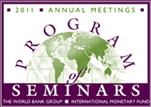Program of Seminars
BBC World Debate - Global Economy:
A Tipping Point?
Thursday, September 22, 2011 12:00 p.m. – 1:15 p.m.
IMF HQ2, Atrium

Nik Gowing,
BBC World News
Panelists

Mohamed
El-Erian
CEO, Pacific
Investment
Management
Company

Austan Goolsbee
Professor,
University
of Chicago Booth School of Business

Christine Lagarde
Managing
Director,
IMF

Olli Rehn
EC Commissioner
for Economic &
Monetary Affairs

Nik Gowing
Moderator,
BBC World News
Participate  Join the conversation on September 22, 2011 - Tweet #bbcimf
Join the conversation on September 22, 2011 - Tweet #bbcimf
Overview

The global recovery is losing momentum and risks are rising. In advanced economies, activity is slowing further and chances of falling back into recession are now higher. High unemployment, legacy problems in the financial sector, and high public debt constitute serious challenges. In a number of emerging markets, overheating pressures have been a concern and policies have been tightening, but there are also early signs of a slowdown. The debate will focus on how policymakers could collaborate globally to boost the recovery and rebalance growth.
Key questions to be addressed include:
- Is the world economy going through a soft patch or headed towards another downturn? Are policy mistakes partly to blame?
- What specific policies do advanced and emerging countries need to employ to reignite the global recovery? Who needs to do more or change course? Can domestic political constraints be overcome to formulate the necessary policies that can address the challenges the world economy is facing now?
- Are policies working in concert or in conflict across countries? How do we make sure the policy choices of advanced and emerging market countries do not create tensions that could threaten growth? For example, are relaxed monetary policies in advanced economies complicating matters for faster-growing emerging economies?
- Can countries cooperate/coordinate on policies better at the global level to boost the recovery and rebalance growth? If so, how can current initiatives by the IMF and G-20 improve the process of international policy coordination? Can they really work?
- How can we translate economic growth into concrete gains for people on the street? What more could or should be done?
Media Partner


